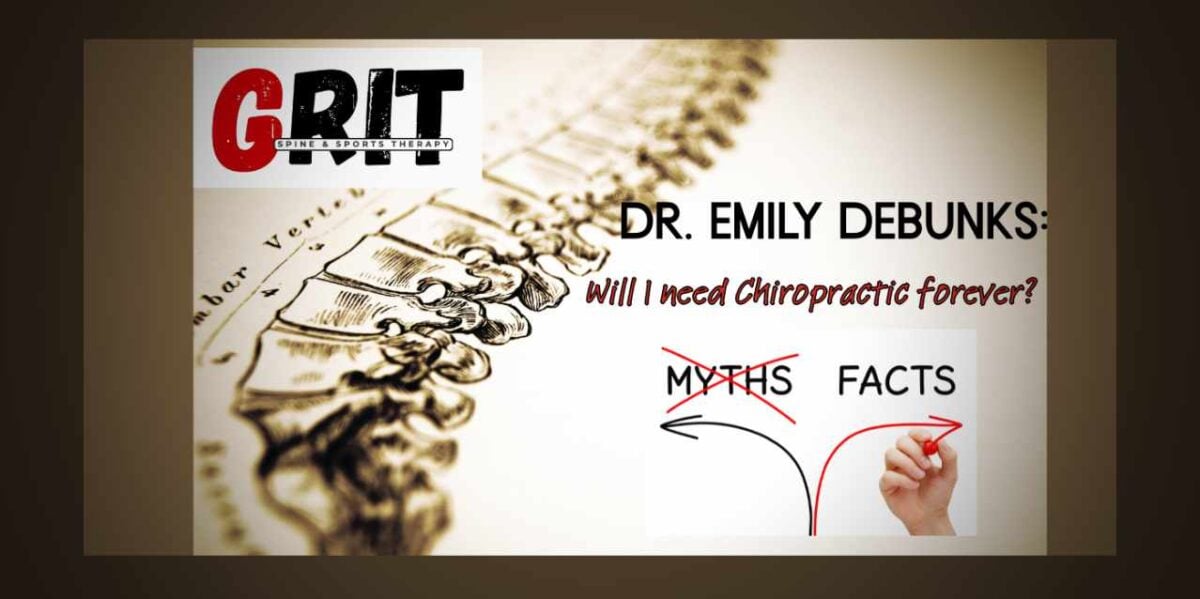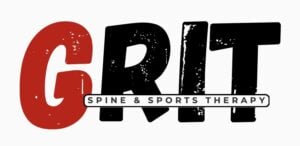Do you really need to see a Chiropractor forever?
Common Myths and Fears Debunked
When many people think of chiropractic care, one of the first concerns they have is:
“Once I start, do I have to keep going forever?”
This is a common myth that has circulated for decades, but it isn’t grounded in how evidence-based chiropractic care actually works. While some patients choose long-term maintenance care “tune-ups” after seeing the value in the care they receive, the majority of treatment plans are designed to progress towards independence, recovery, and prevention. Let Dr. Emily Zacharias break down this myth and explain how evidence-based techniques like myofascial release and rehabilitative exercises help adjustments hold longer, so patients can get better faster – and stay better longer.
Myth #1: Chiropractic Means Endless Adjustments
The idea that chiropractic care locks you into lifetime visits should be outdated. At Grit Spine & Sports Therapy, treatment plans are designed to be progressive, with the initial focus on diagnosis and symptom relief, and as mobility improves, care naturally shifting towards active rehabilitation. This might include stretches, mobility drills, and strengthening exercises. Research supports the care philosophy that incorporating exercise and rehabilitation into chiropractic care not only reduces pain but helps to prevent reoccurrence by correcting underlying movement dysfunction, rather than just managing symptoms.
Myth #2: Adjustments Alone are Enough
While chiropractic adjustments are a powerful tool for restoring motion to a joint, they aren’t the whole picture. The soft tissues surrounding your joints – muscles, ligaments, and fascia – often hold tension patterns that pull on the joint at which they closely attach, restricting movement all over again. This is where techniques such as myofascial release comes in. At Grit Spine & Sports Therapy, Dr. Emily incorporates myofascial release and other techniques designed to reduce adhesions in muscles, improve circulation to injured areas, and restore joint motion. By addressing both the skeletal system and the supporting tissues, adjustments last longer, and recovery accelerates.
Conditions Chiropractic Can Help With
Chiropractic care, when combined with rehab exercises and soft tissue therapies can help with a wide range of conditions where both joint and muscle dysfunction are at play. These include:
- Low back pain and Sciatica
- Hip pain
- Neck pain and Headaches
- Shoulder pain and rotator cuff dysfunction
- Plantar fasciitis and foot pain
- Knee pain
- Postural problems
- Sports Injuries and repetitive strains
By resorting motion, releasing fascial tension, and teaching patients how to strengthen and stabilize their bodies, Grit Spine & Sports Therapy address both the symptoms and root causes of these common issues.
The Takeaway
The myth that you’ll need to see a chiropractor forever doesn’t hold up to the modern evidence-based standards at Grit Spine & Sports Therapy. Effective chiropractic care is not about dependency, it’s about progression. Combining adjustments with myofascial release and rehabilitation exercises empowers patients to move, function, and live without ongoing pain or endless office visits.
At Grit Spine & Sports Therapy, chiropractic care is a bridge back to independence.

Contact Info:
- Location: 2108 SW 152nd Street, Suite H, Burien, WA 98166 (map below)
- Phone: (206) 486-0390
- Email: dremily@gritspineandsportstherapy.com
Hours:
- Monday-Thursday: 8 a.m.–6 p.m.
- Fridays: 7:30 a.m.–4 p.m.
NOTE: If time is limited within business hours, please contact Dr. Emily to find a time to accommodate your needs.
Website: https://www.gritspineandsportstherapy.com
Socials:
EDITOR’S NOTE: Sponsored Posts like this are paid, “Native Advertisements” that help businesses and organizations improve their internet presence and all-important SEO. South King Media also underwrites fundraisers from local nonprofits. To learn more about how your business or organization can directly reach our expanding, engaged audience in South King County, please email Theresa Schaefer at vtheresa@comcast.net.



